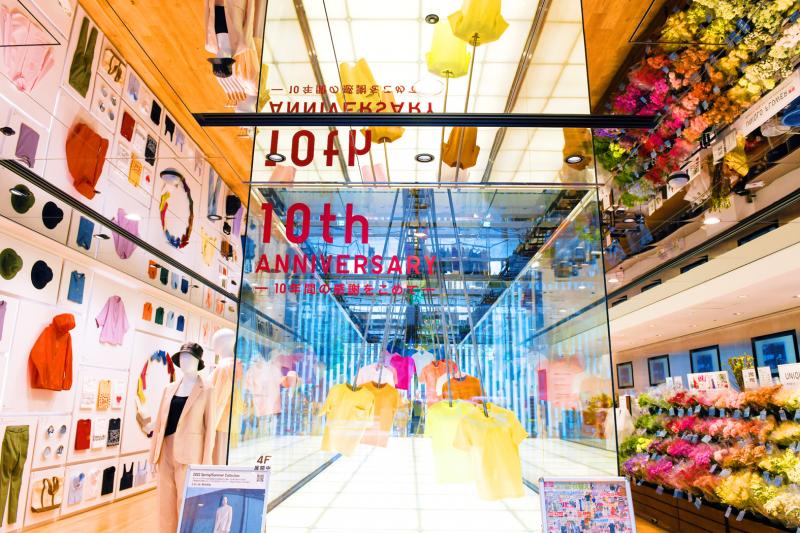Fast Retailing Co, the operator of Japanese clothing giant Uniqlo, yesterday revised its annual net profit forecast upward, even as business in China is affected by COVID-19 lockdowns.
China is a key market for Uniqlo, but consumer spending has been hampered as COVID-19 cases surged in cities such as Shanghai, prompting authorities to impose tough lockdowns under the country’s “zero COVID-19” policy.
Uniqlo operations in China saw “a decrease in revenue and a large decline in profit” for the six months to February, Fast Retailing said, attributing the falls to curbs on movement.

Photo: Bloomberg
However, elsewhere in Asia, business was brisk, buoyed by strong performance in countries such as Malaysia where virus restrictions were eased.
In North America, too, strengthened branding efforts helped boost sales, the company said.
These factors, coupled with what the group described as a “greater diversification” of its revenue streams, led to net profit for the first half of its fiscal year jumping 38.7 percent year-on-year to ¥146.8 billion (US$1.17 billion).
“Operating profit reached a record high, even after stripping out the impact of yen depreciation,” the company said as it logged ¥189.2 billion in operating profit in the first half, up 12.7 percent year-on-year.
The cheap-and-chic Japanese clothing group revised its full-year net profit forecast from the previous ¥175 billion to ¥190 billion.
COVID-19 restrictions have not stopped Fast Retailing from aggressively expanding in “greater China,” where it aims to open 100 new stores each year.
The war in Ukraine has also forced the company to strike a delicate balance between politics and profitability.
Moscow’s invasion has prompted the temporary closure of Uniqlo operations in Russia, where Fast Retailing now expects to “report a loss in the second half of fiscal 2022.”
Separately, Hermes International SCA sales jumped in the first quarter of this year, as consumers spent more on the company’s ready-to-wear clothing and leather bags.
Revenue rose 27 percent at constant exchange rates to 2.77 billion euros (US$3.02 billion) in the first three months of the year, the Birkin bag maker said in a statement yesterday.
The standout performer was the ready-to-wear line, which grew 44 percent, more than double estimates. Growth at its biggest leather goods and saddlery unit also beat expectations.
As of yesterday, three of the company’s 26 stores in China were closed due to lockdowns. The three stores are in Shanghai, Hermes chief financial officer Eric du Halgouet told reporters.
To boost production, Hermes last month announced plans to open two new leather goods workshops in France in 2025 and 2026, which would create 500 jobs. That is on top of three other sites scheduled to open in the next three years to address supply constraints. Hermes is still aiming to increase leather goods volumes between 6 and 7 percent a year, Du Halgouet said.
Hermes is in close contact with its staff in Russia, where its three Moscow stores shut down last month following the invasion of Ukraine, Du Halgouet said.
Russia represents less than 1 percent of total group sales, he said.
The company had planned to open a store in St Petersburg in June, but that is now suspended, he said.
Additional reporting by Bloomberg

The Eurovision Song Contest has seen a surge in punter interest at the bookmakers, becoming a major betting event, experts said ahead of last night’s giant glamfest in Basel. “Eurovision has quietly become one of the biggest betting events of the year,” said Tomi Huttunen, senior manager of the Online Computer Finland (OCS) betting and casino platform. Betting sites have long been used to gauge which way voters might be leaning ahead of the world’s biggest televised live music event. However, bookmakers highlight a huge increase in engagement in recent years — and this year in particular. “We’ve already passed 2023’s total activity and

BIG BUCKS: Chairman Wei is expected to receive NT$34.12 million on a proposed NT$5 cash dividend plan, while the National Development Fund would get NT$8.27 billion Taiwan Semiconductor Manufacturing Co (TSMC, 台積電), the world’s largest contract chipmaker, yesterday announced that its board of directors approved US$15.25 billion in capital appropriations for long-term expansion to meet growing demand. The funds are to be used for installing advanced technology and packaging capacity, expanding mature and specialty technology, and constructing fabs with facility systems, TSMC said in a statement. The board also approved a proposal to distribute a NT$5 cash dividend per share, based on first-quarter earnings per share of NT$13.94, it said. That surpasses the NT$4.50 dividend for the fourth quarter of last year. TSMC has said that while it is eager

‘IMMENSE SWAY’: The top 50 companies, based on market cap, shape everything from technology to consumer trends, advisory firm Visual Capitalist said Taiwan Semiconductor Manufacturing Co (TSMC, 台積電) was ranked the 10th-most valuable company globally this year, market information advisory firm Visual Capitalist said. TSMC sat on a market cap of about US$915 billion as of Monday last week, making it the 10th-most valuable company in the world and No. 1 in Asia, the publisher said in its “50 Most Valuable Companies in the World” list. Visual Capitalist described TSMC as the world’s largest dedicated semiconductor foundry operator that rolls out chips for major tech names such as US consumer electronics brand Apple Inc, and artificial intelligence (AI) chip designers Nvidia Corp and Advanced

Pegatron Corp (和碩), an iPhone assembler for Apple Inc, is to spend NT$5.64 billion (US$186.82 million) to acquire HTC Corp’s (宏達電) factories in Taoyuan and invest NT$578.57 million in its India subsidiary to expand manufacturing capacity, after its board approved the plans on Wednesday. The Taoyuan factories would expand production of consumer electronics, and communication and computing devices, while the India investment would boost production of communications devices and possibly automotive electronics later, a Pegatron official told the Taipei Times by telephone yesterday. Pegatron expects to complete the Taoyuan factory transaction in the third quarter, said the official, who declined to be